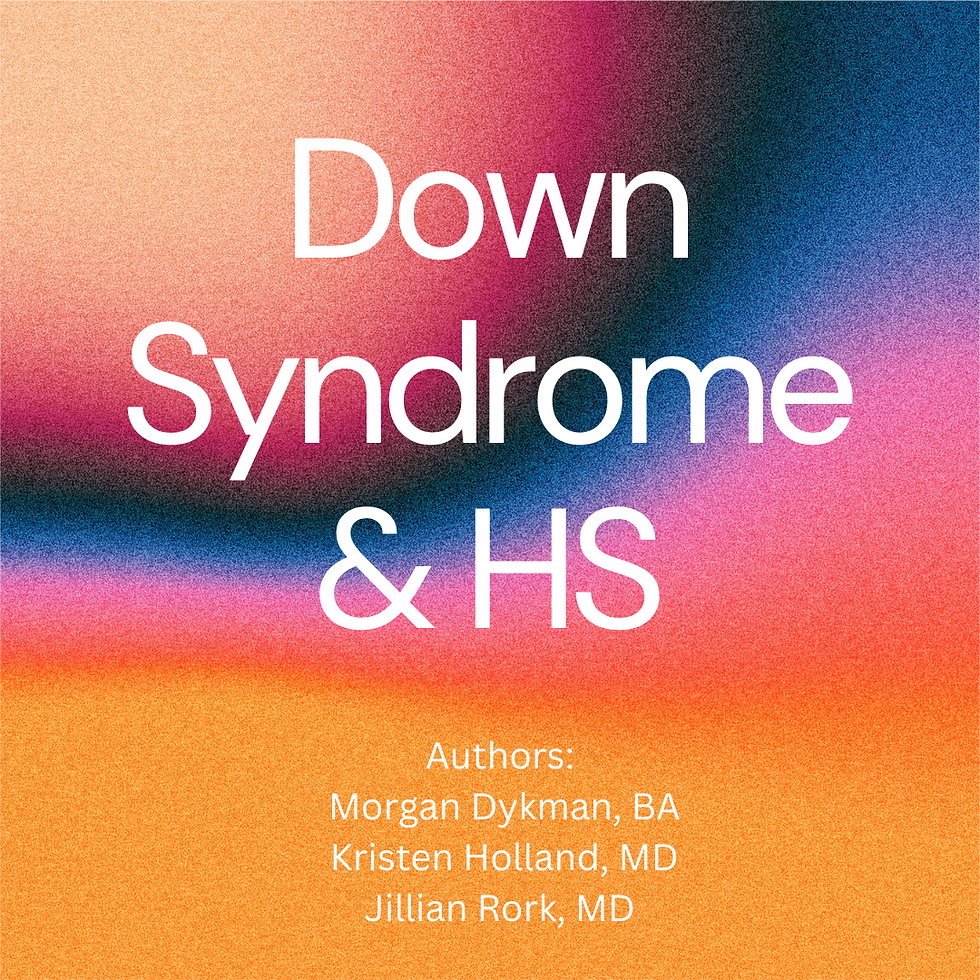Weight and HS
- Denise Panter-Fixsen

- Nov 13, 2020
- 3 min read
Updated: Jul 29, 2021
How many of us have left the doctor’s office being told that losing weight would help our HS or that being overweight is a major reason why we have HS? Let’s set the record straight with regards to the weight issue.

You do not have HS because you are overweight
You did not cause your HS
Anyone, at any weight, can have HS
We’re going to talk about the science first and then we’ll delve into the reality of being an HS patient and weight.
While being overweight did not cause your HS, it can impact the severity of the disease. There are numerous studies that reveal that HS is more severe and more common in those who are overweight, and many studies show improvement in those who have lost weight.
Over the years, several studies have explored the link between obesity/overweight, metabolic syndrome and HS. Obesity is considered to have a leading role in the pathogenesis of several diseases. When it comes to HS, being overweight seems to affect us more in these ways:
Overweight individuals have more and larger skin folds, where skin on skin contact occurs, enhancing mechanical friction.
Mechanical friction contributes to HS development by promoting follicular occlusion and by triggering rupture of dilated follicles in a genetically susceptible individual.
The higher than usual skin temperature and humid microclimate (local tissue temperature and moisture) in skin folds create a perfect breeding ground for bacterial growth (AKA microbiome).
Bacterial infection has long been suspected to play a secondary role in the pathogenesis of HS. The bacterial colonization leads to a series of pathogen-associated molecular pathways, which may contribute to worsening inflammation.
Obesity causes a low-grade, subacute, systemic inflammatory state. This inflammatory state produces increased circulating levels of pro-inflammatory cytokines, such as TNF-α. TNF-α is a pro-inflammatory cytokine that plays an important role in the control of lipid metabolism and interferes with the signaling of insulin, whose circulating levels are increased with obesity/overweight and is decreased with weight loss. Insulin has an important role in homeostasis and physiology of the skin and has protean cutaneous manifestations (skin manifestations). An increase in TNF-α in skin lesions of patients with HS has been demonstrated and suggests a key role of this cytokine in the pathogenesis.
Weight loss is encouraged for general health. It is possible that losing weight will help with your HS, however, the potential also exists that losing weight will not have any impact on your HS, and we’ve seen both scenarios. Weight loss can also result in excess hanging skin which also has the potential of exacerbating your HS.
If you’re considering gastric bypass or any other weight loss surgery, please speak to a specialist. Do not base your decision to have weight loss surgery based on your HS alone as it is not a cure and in some cases may not have any impact on your HS.
There are 50 hormones in the human body and several ways that our hormones contribute to our weight and diseases; poor diet, nutrition, and being overweight are on the list. For many people hormones affect our HS acts and are a trigger for many. Losing weight may help bring your hormones back to their optimal levels.
Many of us start out at an average weight and gain weight because of HS and the inability to exercise due to pain and/or that flares are caused by exercise friction or sweat. If this represents your situation, please be sure to discuss it with your doctor.
If you have always been thin with HS and have put on weight (for whatever reason) with no change to your HS based on your weight gain, please ensure your dermatologist is aware of this. Please educate them that weight is most likely not a factor for you based on your personal experience. The same scenario applies if you’ve always been overweight and have lost weight with no changes in your HS.
The best method is to strive for a better and more healthy lifestyle, no matter what illnesses or conditions you have.
Content in this article is not intended to be a substitute for professional medical advice, diagnosis, or treatment. Always seek the advice of your physician or other qualified health provider with any questions you may have regarding a medical condition. Never disregard professional medical advice or delay seeking treatment because of something you have read on this website.
Written by Denise Panter-Fixsen
Edited by Brindley Kons Brooks



